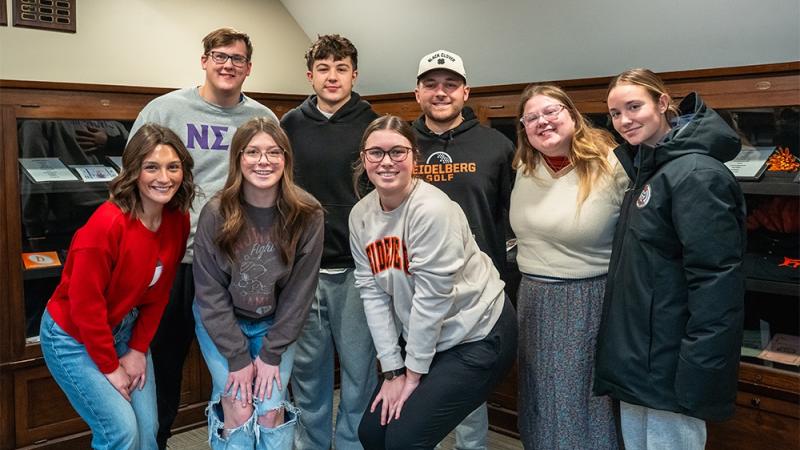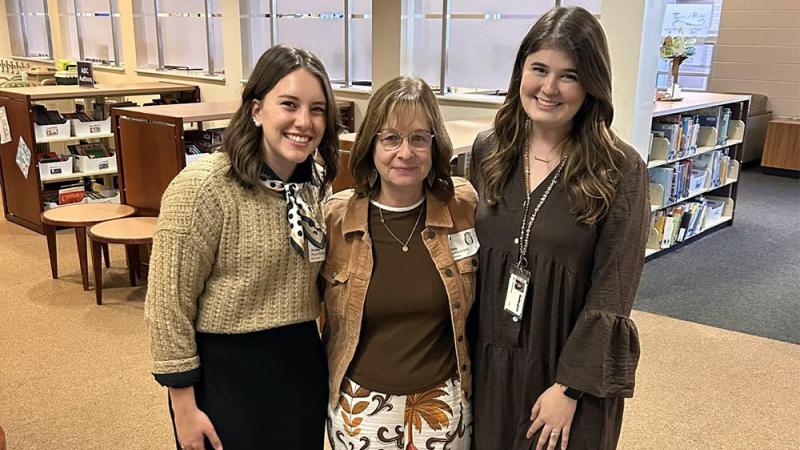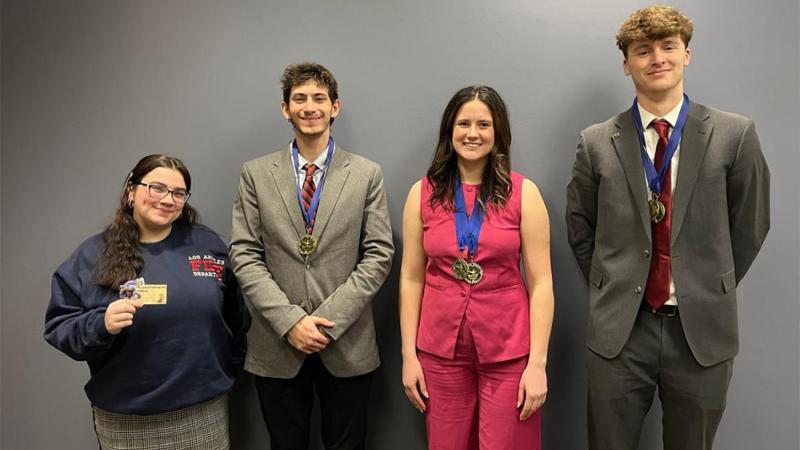kNOwing Justice: A Death Penalty Discussion
On Wednesday, Heidelberg hosted five panelists to share their stories, each impacted by the death penalty in Ohio. Hosted by Dr. Sarah Lazzari and Chaplain Paul Sittason Stark as part of their k(NO)w Justice course, these panelists shared their experiences with a room of invested students, dedicated only to sharing their truths, regardless of the minds their stories changed. "Our first-year students spent the last month researching and debating different aspects of capital punishment," Reverend Paul Stark explained of the course, "they were able to fully engage in conversations with one person exonerated from his death row conviction as well as co-victims of murder."
The five panelists included Kwame Ajamu, LaShawn Ajamu, Jonathan Mann, Rev. Jack Sullivan, and Jennifer Pryor. Each worked for different organizations, but came together under the umbrella of #NoDeathPenaltyOhio, an organization dedicated to urging criminal justice reform from the state government.

Kwame Ajamu and two of his friends were exonerated in 2014. The three were teenagers living in Cleveland when they were falsely convicted of the robbery and homicide of Harold Franks in 1975. With no relation to the crime or the scene, their conviction was caused by the inconsistent testimony of then-13-year-old Eddie Vernon, who was coerced by police into providing false statements. Kwame was released from prison on parole in 2003, having lost 28 years of his life at that point, confined in solitary as is typical of death row inmates.
“It’s a psychological atrocity that we must not have go on at all against humans,” Kwame shared about his experience in solitary confinement. Many human beings who have gone through similar treatment to Kwame cannot even speak about their experiences, because of the level of psychological damage done. Today, Kwame talks about the “mighty urgent need” of ending state-sponsored murders.
LaShawn Ajumu, wife of Kwame, had her own story to tell about the justice system, explaining that in 1997, her brother, James Nero, was shot in the face following a car accident. Terry Freeman, son of the sheriff of Canton, Ohio, at the time, had run into James’ vehicle. Upon James demanding Terry’s insurance information, Terry produced a gun and killed James. A few days after committing the murder, Terry turned himself in. While LaShawn and her family wondered how they were going to afford to bury her brother, Terry was acquitted on a premise of self-defense. With no support for her family in the midst of their grief, LaShawn searched for programs to help them manage with their loss, and found none. What she found instead was that those funds that states dedicated to seeking justice usually went to killing a murderer – when what her family really needed was help managing the burden of a life without James.
Jonathan Mann said he believed heavily in the death penalty when his father was murdered. In fact, Jonathan stated outright that he wanted his father’s murderer to die. As the court case against the murderer dragged on for 26 months, Jonathan had to deal with his life’s greatest shame: “I couldn’t afford to bury my dad.” While the state of Ohio sought revenge on Jonathan’s behalf, no care was offered to him or his family. “We’re talking about this big thing, justice,” Jonathan noted. “Shouldn’t we start by taking care of the people who’ve been wronged?”
Although the greatest shame of his life, Jonathan shares his story openly and widely in talks like this one and around the internet, to let others in his situation know they aren’t alone. While Jonathan stressed about the financial burden of grief, strangers approached him to ask about the tragedy of his father’s passing. “I wouldn’t wish going through a death penalty trial on my worst enemy,” Jonathan said, as he was constantly reminded and asked to recount the greatest trauma of his life to reporters. Even recently, he was asked by a director from Netflix for photos and recollections about his father, looking to exploit Jonathan’s greatest tragedy for entertainment. “I didn’t think this was going to happen to me,” Jonathan recalled, “but I’m still going through it today.”
Rev. Jack Sullivan, executive director of the Ohio Council of Churches, was at a dance following a Christian conference in Denver during the summer of 1997. He had always been against the death penalty as a matter of religious principle. In the middle of the dance, he was called out of the room to take a phone call that would change his life. His baby sister, Jennifer Sullivan, had been murdered in her home. Immediately, he had to go home and work with his sister and grandfather to figure out funeral arrangements and who would care for Jennifer’s 2-year-old daughter, Imani, who may have been a witness to the crime. It was the reverend’s responsibility to identify Jennifer’s body and to go through the traumatic event of witnessing his sister’s gunshot wound, and then to carry on with preparations for life without her. A few days after Jennifer’s funeral, the reverend reached out to the Ohio Victims’ Assistance Fund, in an attempt to secure financial aid for little Imani. They wrote to him in return, telling him that they had received his request. He still has not received any response of substance from the organization, he said. Similarly, although the family worked with the Cleveland Police Department, Jennifer’s murder remains unsolved. Without the support of the church community in the days following Jennifer’s passing, Jack isn’t sure that he could have gone on.
Although Jennifer’s murderer hasn’t been found, Jack knows his stance on the matter. “In no way do I want the state to kill in my name,” he said. Since his family’s tragedy, Jack has done some math: $16 million has been spent since Jennifer’s murder on executions in the state of Ohio. “About $16 million to kill people who killed other people to show that killing is wrong,” he estimated. “Spend the money on the victims’ families.”
Jennifer Pryor serves as the Director of Organizing and Community Outreach for Ohioans to Stop Executions. Her passion for ending the capital punishment system began in 2020. “I commend you all for taking interest in justice,” Jennifer told the students in attendance. It is her goal to create and take action to bring more humanity to the criminal justice system. In Ohio, the “error rate” for executions is higher than the average for the United States; for every five people executed, one is exonerated – a figure that does little to indicate how many people out of those executed are truly innocent – and only those who were found to be innocent after years in solitary confinement like Kwane was. “Reverend Jack Sullivan made a really good point today,” Dr. Sarah Lazzari commented on the issue of the error rate after the discussion, “He compared putting the wrong people on death row to that of airplane crashes. If the airlines got it wrong, as often as our legal system gets it wrong, we would shut down the airlines until they fixed the problems.”
Many of the people on death row, according to the statistics Pryor provided, were not the “worst of the worst.” More often than not, she said, they were simply people who did not have the time or resources to be redeemed. And more often than not, according to the statistics, these people are minorities. Among the more notable of the facts Pryor presented was the tendencies of countries without a death penalty to have lower rates of murder. “When societies say that they value life, the society values life,” she explained.
Jennifer’s role in the event was to mobilize students who did not believe in the death penalty to express their beliefs to their government representatives. As more and more realize the truth behind the death penalty, more are turning against it, she said. Even professional executors with whom Jennifer had discussions were suffering psychological strain upon learning that the death certificates of every one the state executed deemed their cause of death “homicide.”
The bipartisan issue of capital punishment is of serious importance to University faculty, staff and students, as demonstrated by the engagement and attendance of the talk on Wednesday. “The Death Penalty is a very complicated issue and can be very polarizing,” Dr. Lazzari acknowledged. “Our hope is to challenge our students to explore the topic and to come to their own decision about where they land.” Although Lazzari herself tries not to put her own opinions into this vital conversation with students, “you can't argue when you hear from a man who spent years on death row only to be exonerated by DNA evidence.” Through efforts by those invested individuals, Heidelberg students are increasingly coming face to face with the true meaning of justice.




